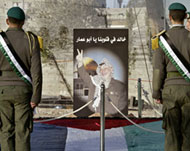Palestinians remember Arafat
Palestinians are commemorating the first anniversary of the death of Yasser Arafat, their iconic leader who even in death embodies their struggle for independence and statehood.

Twelve months to the day since Arafat died in a Paris hospital, aged 75, thousands of Palestinians were expected to attend a rally in the West Bank on Friday to remember the man who guided Palestinian aspirations for four decades.
Likened to Adolf Hitler by Israeli leaders, accused of fomenting violence and branded an obstacle to peace by Israel and Washington, Arafat’s passing has done little to re-ignite the stagnant Middle East peace process.
Conspiracy theories that he was poisoned still abound despite doctors finding no trace of toxins, piling yet more mystery on the life and legacy of a man who shared the 1994 Nobel Peace Prize with the then Israeli Prime Minister Yitzhak Rabin.
His temporary glass mausoleum in the courtyard of the Palestinian Authority headquarters in Ram Allah, will provide the focus for official commemorations.
Arafat memorial
A picture of a smiling Arafat, head enveloped in his trademark black and white chequered headscarf, making the V for victory sign with the al-Aqsa mosque of occupied east Jerusalem in the background, hangs alongside the grave.
 |
|
A new museum-mausoleum and |
The foundation stone of a new Arafat museum-mosque-mausoleum complex will be laid, Friday prayers delivered and an afternoon rally organised to honour the leader whom millions of Palestinians knew as Abu Ammar.
Palestinian officials, including his successor President Mahmoud Abbas, will address the crowd. Religious leaders and foreign diplomats have been invited.
The ruling Fatah party that Arafat founded in 1965 is organising another rally in Gaza City on Saturday.
Palestinian-US relations may have warmed up significantly, with the moderate violence-denouncing Abbas visiting Washington twice since May, but optimism generated by Israel‘s historic pullout from the Gaza Strip has yielded little.
Bloodshed has continued on both sides. Palestinian bombings and rocket attacks have been met by Israeli air raids and targeted killings over the Gaza Strip and arrest operations throughout the West Bank.
Bypass approach
In an article in Britain‘s The Financial Times newspaper published to mark Friday’s anniversary, Palestinian chief negotiator Saeb Erikat accused Israel of attempting to bypass the peace process.
“The bypass approach attempts to evade international law, sidestep justice and circumvent long-held Palestinian aspirations for freedom” Saeb Erikat, |
“The bypass approach attempts to evade international law, sidestep justice and circumvent long-held Palestinian aspirations for freedom,” he said, condemning Israeli settlement activity and a vast West Bank separation barrier.
“By again propagating the myth that a democratically elected Palestinian president cannot serve as a peace partner, Israel hopes to buy time to implement its unilateral disengagement from the two-state solution.”
After a bomb attack in October, Israeli Prime Minister Ariel Sharon ruled out a resumption of talks with Abbas and accused his leadership of taking no serious action against the resistance movement – the same accusations levelled at Arafat.
On the Palestinian street and corridors of power alike, mystery continues to surround Arafat’s dramatic demise and airlift to Paris after he was effectively imprisoned in the Muqataa, his headquarters in Ram Allah, by Israeli occupation soldiers for two and a half years.